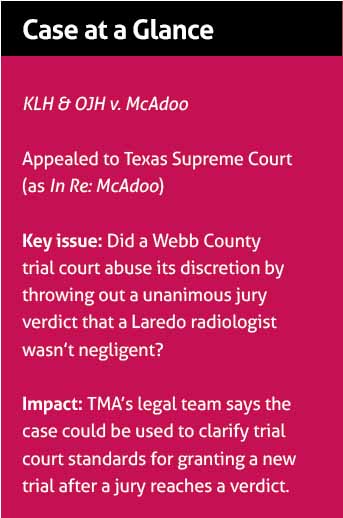
It was an overwhelming, 12-0 verdict – a jury’s unanimous rejection of a negligence case against a Laredo physician. Then, a judge took that decision away and ordered a new trial – not because of jury misconduct, or any procedural stumble that usually negates a court decision. It was taken away, essentially, because the judge said so.
Until recently, physicians had no recourse when a judge unilaterally overturned a verdict favorable to a doctor. Now they do, and the Texas Medical Association is monitoring one such challenge sitting in the Texas Supreme Court because medicine wants to see a consistent and transparent standard for reviewing requests for a new trial. In an appeal related to KJH & OJH v. McAdoo, Andrew McAdoo, MD, had asked the high court to reinstate a trial court verdict in his favor.
Dr. McAdoo was working as a radiologist in Laredo in 2013 when he treated a 10-year-old girl in an emergency department (ED). The girl’s parents later sued Dr. McAdoo over what they claimed was a misdiagnosis that caused a crucial delay in her treatment and resulted in the partial loss of one of the girl’s fallopian tubes.
In 2016, Dr. McAdoo won that case. But just months later, a Webb County judge decided the jury’s verdict didn’t align with the “preponderance of the evidence,” and granted the parents’ request for a new trial.
Houston emergency physician Diana Fite, MD, chair of TMA’s Board of Trustees, says the case “sets a horrible precedent” when a judge can unilaterally decide that a jury’s verdict wasn’t correct. The Board of Trustees reviews and approves TMA’s involvement in legal matters.
Dr. Fite notes that the jury in this case listened to testimony from 11 witnesses and reviewed 925 pages of exhibits.
“To have to go through all that – the mental stress and everything that the physician goes through, and to get a positive verdict for yourself, and then to have it just taken away? That’s just not fair,” she said.

An alleged delay and a lawsuit
In August 2013, the parents of the child, referred to in court filings as JPH, took their daughter to the ED at Doctors Hospital in Laredo. The child was complaining of severe abdominal pain and underwent a CT scan.
Dr. McAdoo, the on-call radiologist, made a preliminary diagnosis that included pyosalpinx, a condition in which the fallopian tube fills and swells with pus, court documents say. Based on the diagnosis, the ED physician began treating the girl with antibiotics for a potential infection. The girl’s on-call pediatrician recommended transferring her to a hospital in San Antonio for better pediatric care, and her family requested her transfer to Methodist Hospital.
The transfer process began at approximately 1 am, but Methodist Hospital staff required Doctors Hospital to file a police report first, because they thought the pyosalpinx finding indicated potential sexual abuse, legal records state. The Laredo Police Department came to Doctors Hospital and filed an incident report, and JPH left for San Antonio at about 4 am, arriving at the Methodist ED shortly before 6 am the same day.
There, according to court documents, a second radiologist reviewed the child’s CT scan and recommended an ultrasound. The ultrasound report noted that a “hydrosalpinx or pyosalpinx is present” and also diagnosed the presence of an infection. Hydrosalpinx is a condition where fluid blocks the fallopian tube; it can impact a person’s fertility.
The child eventually had laparoscopic surgery at 4:30 pm, in which a necrotic portion of her left fallopian tube was removed. The surgery revealed the fallopian tube was twisted, caused by “an ovarian cyst that enlarged and moved the tube into an abnormal position,” according to court documents.
The parents sued both Doctors Hospital and Dr. McAdoo for negligence. They alleged his misinterpretation of the CT scan and misdiagnosis – which triggered a police report that delayed her treatment – led to the loss of part of JPH’s fallopian tube.
Doctors Hospital reached a confidential settlement with the parents, but their case against Dr. McAdoo proceeded to a five-day trial. In October 2016, jurors unanimously found that Dr. McAdoo was not negligent in treating the child.
The parents sought a new trial in December 2016. Webb County District Judge Beckie Palomo granted the new trial in February 2017, writing that the jury’s findings were “so contrary to the overwhelming weight and preponderance of the evidence … to be manifestly unjust.” The trial court cited an expert for the parents, who testified that Dr. McAdoo’s diagnosis did not include a differential diagnosis such as hydrosalpinx and “may have” contributed to the girl’s injuries by delaying treatment.
Dr. McAdoo appealed that order to the 4th Court of Appeals in San Antonio, seeking to reinstate the jury’s verdict and avoid a new trial. Both a three-justice panel and a full-court, seven-justice review found in favor of the parents; however, one of those justices, Marialyn Barnard, wrote a 17-page dissent saying the jury had reached its verdict properly.
Illegal substitution
In his petition to the Supreme Court, Dr. McAdoo argues that the trial judge “obviously substituted her judgment for that of the jury’s without any valid basis,” and says the evidence establishes “conclusively” that he didn’t cause the child to lose part of her fallopian tube.
Dr. McAdoo also says the trial court’s “‘may have’ and ‘could have’ standards … were grossly inadequate and could not, under unmistakable Texas law, support a conclusion that the jury’s verdict was against the great weight and preponderance of the evidence.”
Brent Cooper, an attorney assisting TMA on the case, says Dr. McAdoo’s situation is not uncommon for physicians.
“I can’t tell you how many we’ve seen just this year where [judges] do that, where obviously the plaintiff may have some significant injuries, but there’s just no liability,” he said. “And the jury determines that, and the judge just grants a new trial. And a lot of the judges – they’re not shy about it – will say, ‘I’m going to keep granting a new trial until the jury awards something to this plaintiff.’”
Doctors couldn’t even get those decisions reviewed until about 10 years ago, Mr. Cooper says. That’s when the state high court “started opening the door for a review very slightly.”
“It’s not up to the trial court, when you have a jury, to judge the credibility of the witnesses. That’s for the jury to do,” he said. “And the trial [judge] should not be substituting her judgment for the judgment of the jury. In essence, you’re sort of denying the parties of a right to a trial by jury if the trial [judge] is going to null what a jury said and substitute her judgment.
“Number two, ... there was no evidence that if the doctor had done what they said he should have done, it would’ve made any difference in the outcome. If you look at the opinion, the trial court just said, ‘Well, it may have made a difference or it could have made a difference.’ Texas Supreme Court authority has said that’s not enough.”
Attorneys for both Dr. McAdoo and the parents did not return calls from Texas Medicine. Dr. McAdoo filed in January asking the Supreme Court to take up the case. At press time, Mr. Cooper said there was an indication the case could get dismissed at the trial court level.
Tex Med. 2019;115(6):15-17
June 2019 Texas Medicine Contents
Texas Medicine Main Page
Clarification: This story has been updated to say the case could get dismissed at the trial court level.